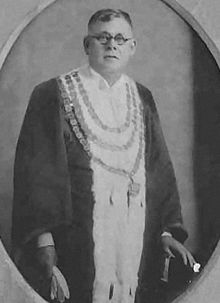Alfred Jones (politician)
|
The Honourable Alfred Jones |
|
|---|---|
 |
|
| 4th Lord Mayor of Brisbane | |
|
In office 1934–1940 |
|
| Preceded by | Billy Greene |
| Succeeded by | John Beals Chandler |
| Member of the Queensland Legislative Assembly for Burnett |
|
|
In office 27 August 1904 – 2 October 1909 |
|
| Preceded by | William Kent |
| Succeeded by | Robert Hodge |
| Member of the Queensland Legislative Assembly for Maryborough |
|
|
In office 22 May 1915 – 14 February 1917 |
|
| Preceded by | Edward Corser |
| Succeeded by | David Weir |
| Member of the Queensland Legislative Council | |
|
In office 15 February 1917 – 16 September 1920 |
|
|
In office 21 October 1920 – 24 February 1922 |
|
| Member of the Queensland Legislative Assembly for Paddington |
|
|
In office 18 March 1922 – 11 May 1932 |
|
| Preceded by | John Fihelly |
| Succeeded by | Seat abolished |
| Personal details | |
| Born |
Alfred James Jones 4 October 1871 Gayndah, Queensland, Australia |
| Died | 7 October 1945 (aged 74) Brisbane, Queensland, Australia |
| Nationality | Australian |
| Political party | Australian Labor Party |
| Spouse(s) | Martha Elizabeth Leggett |
| Occupation | Drover, shopkeeper, gold miner |
| Religion | Church of England |
Alfred James Jones (4 October 1871 – 7 October 1945) was an Australian politician who served as a Member of the Queensland Legislative Assembly, a Member of the Queensland Legislative Council and as Lord Mayor of Brisbane.
Alfred James Jones was born at Gayndah, Queensland, the son of Joseph Jones and his wife Ann (née Stevens). He received a basic education at Burnett State School and became a and miner. He spent a short time teaching, was a Cobb & Co driver and spent six years mining.
He married Martha Elizabeth Leggett in Gayndah on 1 May 1895 and they had five sons and five daughters: Alfred Stevens, Claude Mills, Gladys Mary, Edward Joseph, Nellie Ann Millicent, Ina, Molly Nundah, Burnett Cranbrook, Allan Halley, and Dorothy Clara.
Jones contested four Legislative Assembly of Queensland seats for the Australian Labor Party, and held three of them. He won Burnett in 1904 with 68% of the vote, but lost the seat after one term and failed to regain it in the 1912 election.
He won Maryborough in 1915 with about 56% of the vote. Jones resigned on 14 February 1917 to enter the upper house, the Queensland Legislative Council.
Jones was appointed to the Queensland Legislative Council on 14 February 1917, where he was the representative of the Government and also Minister for Mines.
He resigned from the Legislative Council on 16 September 1920 in order to contest the lower house seat of Carnarvon in 1920 but was not elected, and was returned to the upper house on 21 October 1920. He was one of the last members of the Queensland Legislative Council, as he led the vote to abolish the upper house in 1921, leading to its abolition on 3 March 1922.
...
Wikipedia
